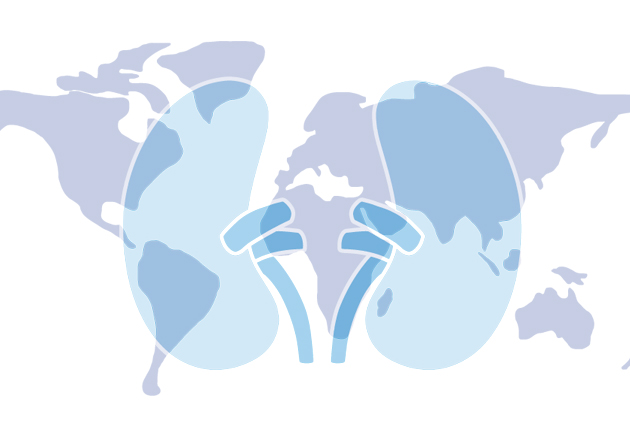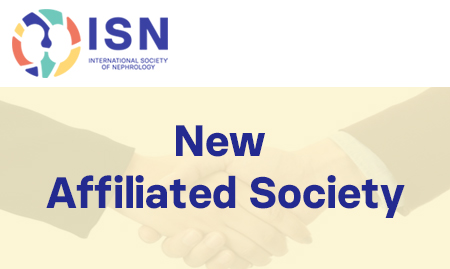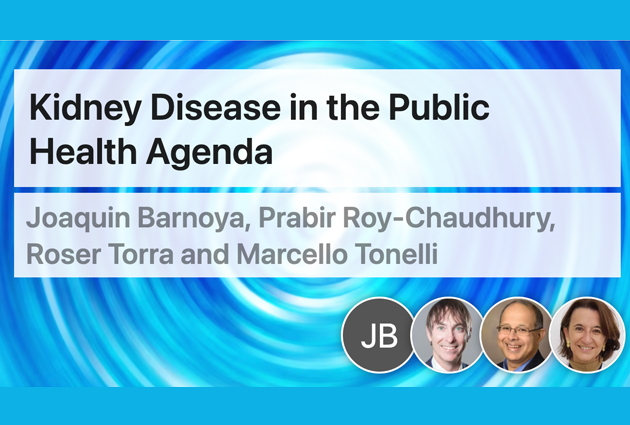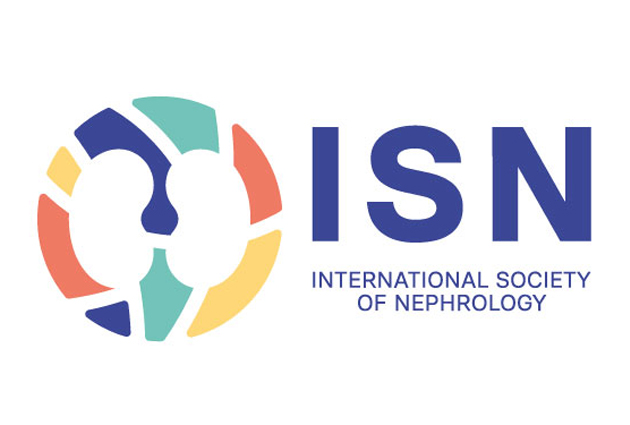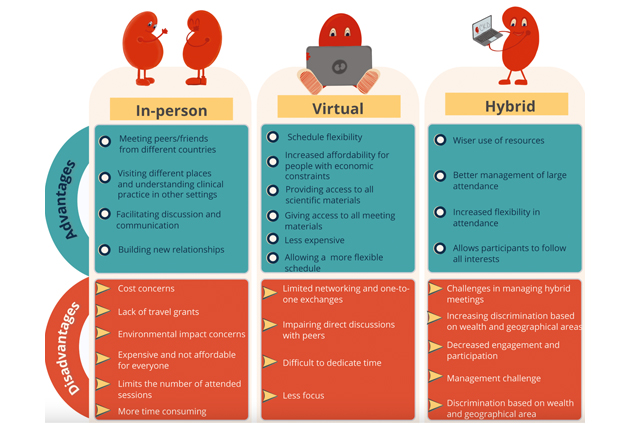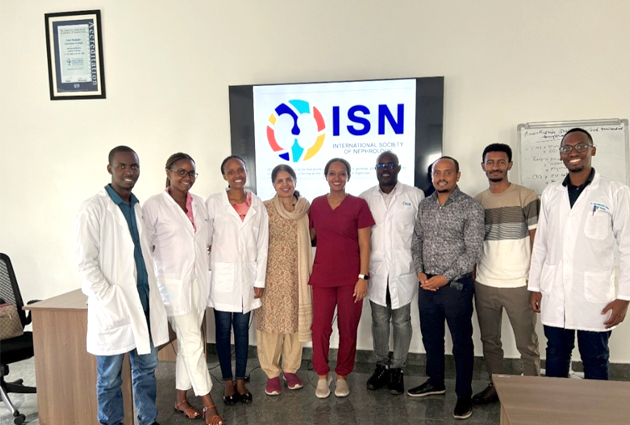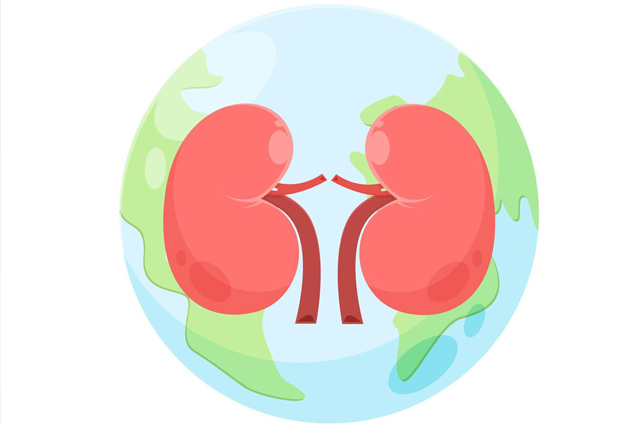ISN Advocacy Newsletter – Bridging the Gaps – July 2021
Bridging the Gaps: ISN Advocacy In Action to Advance Kidney Health

Welcome members and allies to the third edition of Bridging the Gaps, the ISN’s quarterly update on how we are advocating and collaborating with partners to tackle the global burden of kidney disease.
Despite the ongoing workplace challenges posed by the Covid-19 pandemic, a huge amount of productive work has been done with our partners since I last wrote to you.
With the pandemic’s disproportionate impact on kidney patients slowly, but hopefully inevitably, receding thanks to their prioritization within vaccination programs, we must learn from the mistakes made and work collaboratively to ensure that kidney patients’ interests are factored into the development of future emergency preparedness and response planning.
With over 850 million people worldwide living with kidney disease of some type, it is imperative that patient voices are heard as we all seek to build back not just better but fairer from the pandemic’s devastating consequences.
A critical part of this will be raising awareness of the importance of kidney care beyond the health sector. Therefore, I want to highlight the key role that our World Kidney Day campaign and “Are your Kidneys Healthy?” quiz can play in changing public perceptions about the vital role of the kidneys in our overall health.
We will only secure a future where everybody has equitable access to sustainable kidney health through collaboration with partners like yourselves. Please do share these awareness-raising materials and the rest of the content below with your networks.
Late-breaking news is included below as main feature!
Best,
![]()
Agnes Fogo
ISN President
The ISN Is Granted Consultative Status with ECOSOC
The ISN is pleased to announce that the ECOSOC Management Segment officially granted ISN with Special Consultative Status following the United Nation (UN)’s Committee on NGOs’ recommendation for consultative status to the United Nations Economic and Social Council (ECOSOC) 2021 at its regular session.
ECOSOC, one of the six main organs of the UN, is at the heart of the UN system to advance three dimensions of sustainable development – economic, social, and environmental and is the only main UN body with a formal framework for NGO participation.
Obtaining Special Consultative Status with ECOSOC is a significant step ensuring ISN’s presence within multiple UN initiatives and allowing ISN access to ECOSOC’s many subsidiary bodies and forums, multiple human rights mechanisms of the UN, and special events organized by the president of the General Assembly.
The ISN looks forward to working closely with ECOSOC and contributing to the UN’s work to advance kidney health and tackle the global burden of kidney disease.
The ISN is pleased to present the report, “Global Kidney Policy Forum 2021: Focus on North America and the Caribbean,” which summarizes the principal kidney-related challenges affecting the ISN North America and Caribbean region and provides concrete proposals to deliver best-practice kidney care, as outlined by speakers at the Global Kidney Policy Forum (GKPF’21).
The ISN hosted the GKPF’21 in April as part of the Virtual World Congress of Nephrology (VWCN’21), bringing together key decision-makers and stakeholders to address the burden of kidney diseases and discuss policies to improve their prevention and management.
We will be working with partners in the region to motivate policymakers and politicians to become agents of change in delivering equitable access to kidney care. The emphasis will be on translating the forum’s recommendations into reality to address the significant variations in the accessibility, affordability, and quality of care throughout the region. For example, by using the ISN Framework for Developing Dialysis Programs in Low-Resource Settings to ensure equal access to quality dialysis for kidney failure patients in this region and beyond. The framework was launched at the GKPF’21 and is now available on the WHO’s noncommunicable diseases webpage.
The ISN’s advocacy team was privileged to submit, both as a co- and sole-signatory, and speak in support of several items at the 74th World Health Assembly (WHA), held virtually by the World Health Organization (WHO) from May 24 to June 1, 2021.
Working alongside members of the Global Coalition for Circulatory Health (GCCH) and other partners, including the Noncommunicable Disease Alliance, the World Dental Federation, and the International Association for Dental Research, the ISN co-signed four statements advising Member States of the need to improve kidney health by:
- Strengthening WHO’s global emergency preparedness and response.
- Enhancing global action on patient safety across the health care spectrum.
- Prioritizing the prevention, diagnosis, and management of diabetes (the leading cause of stroke and cardiovascular and kidney diseases).
- Embedding oral health care within both the noncommunicable disease (NCD) agenda and universal health coverage programs.
The ISN was the sole signatory of two additional statements advising member states of the need to:
- Tackle kidney disease in women’s, children’s, and adolescents’ health through consistent implementation of the eponymous Global Strategy (2016 – 2030).
- Reduce health care inequalities and address social health determinants that increase kidney diseases in minority and vulnerable populations.
The ISN is pleased to report that the 74th WHA adopted the proposed resolutions on diabetes, WHO’s global emergency preparedness and response, oral health, the social determinants of health, and the WHO’s flagship “Global Patient Safety Action Plan 2021-2030.” The assembly recommitted to implementing the “Strategy for Women’s, Children’s and Adolescents’ Health (2016−2030).”
The ISN will continue working alongside its partners toward fully implementing the adopted resolutions in WHO’s Member States.
On May 13, ISN President Agnes Fogo spoke at the Third Annual Global Summit on Kidney Innovation: Expanding Patient Choices and Outcomes, organized by the American Association of Kidney Patients and the George Washington University, held virtually from May 13-14, 2021.
As a leader in the global kidney space, Professor Fogo shared her views on the vital role that kidney patients play in research and innovation in the session “International Kidney Innovations Consortium: International Organizations Working in the Space Provide Global Perspectives.” In addition, she outlined how the ISN would help drive change by empowering local communities and supporting fledgling patient groups in lower and middle-income countries.
The ISN considers patient participation in healthcare-related decision-making essential to shaping effective healthcare systems. It firmly supports WHO’s 1978 Alma Ata Declaration, which asserts that “people have the right and duty to participate individually and collectively in the planning and implementation of their health care.”
The ISN also campaigns for more substantial patient involvement in clinical trials to align patient priorities with research outcomes.
The 2021 World Kidney Day campaign, “Living Well With Kidney Disease,” was an outstanding success, as highlighted in the 2021 WKD Impact Report. Over 1,100 events were submitted from 86 countries, and 114 champions in 64 countries working with kidney disease patients supported the event.
On June 10, 2021, three world-renowned speakers presented at the live “ISN-IFKF Webinar: Spotlight on World Kidney Day – Prevention of Chronic Kidney Disease,” followed by a Q&A session.
The WKD Steering committee co-chairs, Professor Robyn Langham and Professor Kam Kalantar, wrote an article on the “Living Well with Kidney Disease” campaign, which features in a current supplement to the UK newspaper The Guardian and supports the recently launched Kidney Health 2021 Campaign.
As the WKD 2021 campaign draws to a close, do stay tuned for the announcement of the 2022 campaign theme in September.
The ISN’s partner, the European Kidney Health Alliance (EKHA), alongside the MEP Group for Kidney Health, held its annual European Kidney Forum on June 18, bringing together high-level stakeholders to discuss concrete policies to benefit kidney patients in Europe.
This year’s forum, “Unmet needs & challenges in access to treatments in Europe: the case of Chronic Kidney Disease,” was organized as part of EKHA’s Decade of the Kidney™ campaign.
Watch a recording of the forum here.
Opening the forum, the EU Commissioner for Health and Food Safety Stella Kyriakides flagged the importance of tackling risk factors like diabetes and hypertension and following a “patient-centered approach” to prevent kidney disease. She also referenced the EU4Health and Horizon Europe funding programs as potential avenues to advance kidney health.
The ISN was pleased to hear MEP Hilde Vautmans and MEP Manuel Pizarro, chair and co-chair of the MEP Group for Kidney Health respectively, voice support for the WKD campaign. They discussed how the EU can help advance kidney health beyond its borders, with Vautmans advising that: “The EU could play a role in improving kidney health and access to treatment in LMICs, which are disproportionally affected by the CKD, via the Africa, Caribbean, and Pacific Partnership and the Africa-EU Partnership.”
MEP Pizarro’s comments on the importance of EU research funding opportunities in tackling kidney disease were also welcome:
“We now have a fantastic opportunity to improve the lives of kidney disease patients with the momentum of the European Health Union and ambitious programs such as Horizon Europe. I have already seen positive examples […] as it recently published a call on medical technology and devices that made a specific reference to radically portable dialysis. I hope future calls will follow suit as ground-breaking innovation in this field is urgently needed, especially in preventing the progression of kidney disease.”
With momentum building at the EU level, the ISN is committed to working alongside EKHA to help develop forward-looking policy solutions to improve the lives of people suffering from kidney disease in both Europe and further afield.
Speaking at the NCD Alliance Southeast Asia and Western Pacific joint multistakeholder dialogue on noncommunicable diseases (NCDs) and building back better after COVID-19, the ISN immediate past President, Vivekanand Jha, shared his views on the importance of intersectoral collaboration for advancing kidney health: “In order to achieve collective impact on people living with NCDs, NGOs, academia, governments, as well as private sector organizations need to collaborate to advance health. Each organization has its specific role to play to reach this common goal.” He added that “As a community, it is essential to invest in the message that the health of the society is good for all, including for businesses, governments, the economy, and civil society, and to develop participatory action research that involves all stakeholders, including industries, to provide concrete solutions to NCD health challenges.”
The outcomes of these dialogues will feed into a comprehensive consultative process contributing toward the “Global Charter on Meaningful Involvement of People Living with NCDs.”
On May 17, World Hypertension Day 2021, the ISN President Agnes Fogo and World Hypertension League President Dr. Xin-Hua Zhang released a joint statement to highlight the interrelatedness between hypertension and kidney disease:
“World Hypertension Day 2021 is May 17 and represents a great opportunity for the International Society of Nephrology (ISN) and the World Hypertension League (WHL) to exhibit the synergistic impact on global health. The partnership of the two organizations addresses the global ‘pandemic’ of kidney disease with the strategies of high blood pressure prevention and control. The theme of World Hypertension Day includes increasing awareness of hypertension risks and the importance of accurate blood pressure measurement. Through this collaboration, disease risks can be impacted in all populations around the world.”
The Declaration of Istanbul Custodian Group (DICG) has developed a free online course, “Ethical Issues In Transplantation and the Declaration of Istanbul,” to equip participants with a thorough knowledge of the principles and recommendations of the Declaration of Istanbul (DOI), the role of the DICG, ethical issues in transplantation, and practical and regional implications of the DOI.
Nephrologists will learn from experts in the field of organ trafficking and transplant tourism on identifying and addressing cases of transplant tourism and illegal organ donations to help increase effective and ethical transplantation practices around the world.
The ten-part course is designed to allow participants to complete each module at their own pace. The modules include a 15-40-minute-long video and additional resources. A certificate will be issued on completion of the course.
The ISN joined the World Health Organization Western Pacific Region Partners’ Forum 2021, showcasing work done at the Global Kidney Policy Forum 2019 in Melbourne, Australia, to help promote kidney health advancement in the region.
Highlighting the success of the World Kidney Day 2021 campaign, “Living Well with Kidney Disease,” and the “ISN Framework for Developing Dialysis Programs in Low-Resource Settings,” the forum helped the ISN establish new connections with a view to collaborative working in the face of the challenges posed to kidney patients by COVID-19.
Northern Ireland has taken a step closer to adopting an “opt-out” system for organ donation, which has the potential to save hundreds of lives via deceased organ donations.
An “opt-out” or “silence is tantamount to consent” system presumes donor consent unless individuals state a preference against deceased organ donation while still alive. The “opt-in” procedure requires donors to give explicit consent when alive or requires their family’s consent on their behalf if they are deceased.
In agreement with comments from BBC Northern Ireland sports journalist Stephen Watson – a kidney transplant patient himself – the ISN calls for other countries to adopt an “opt-out” policy and make a considerable difference to kidney donation rates worldwide.


